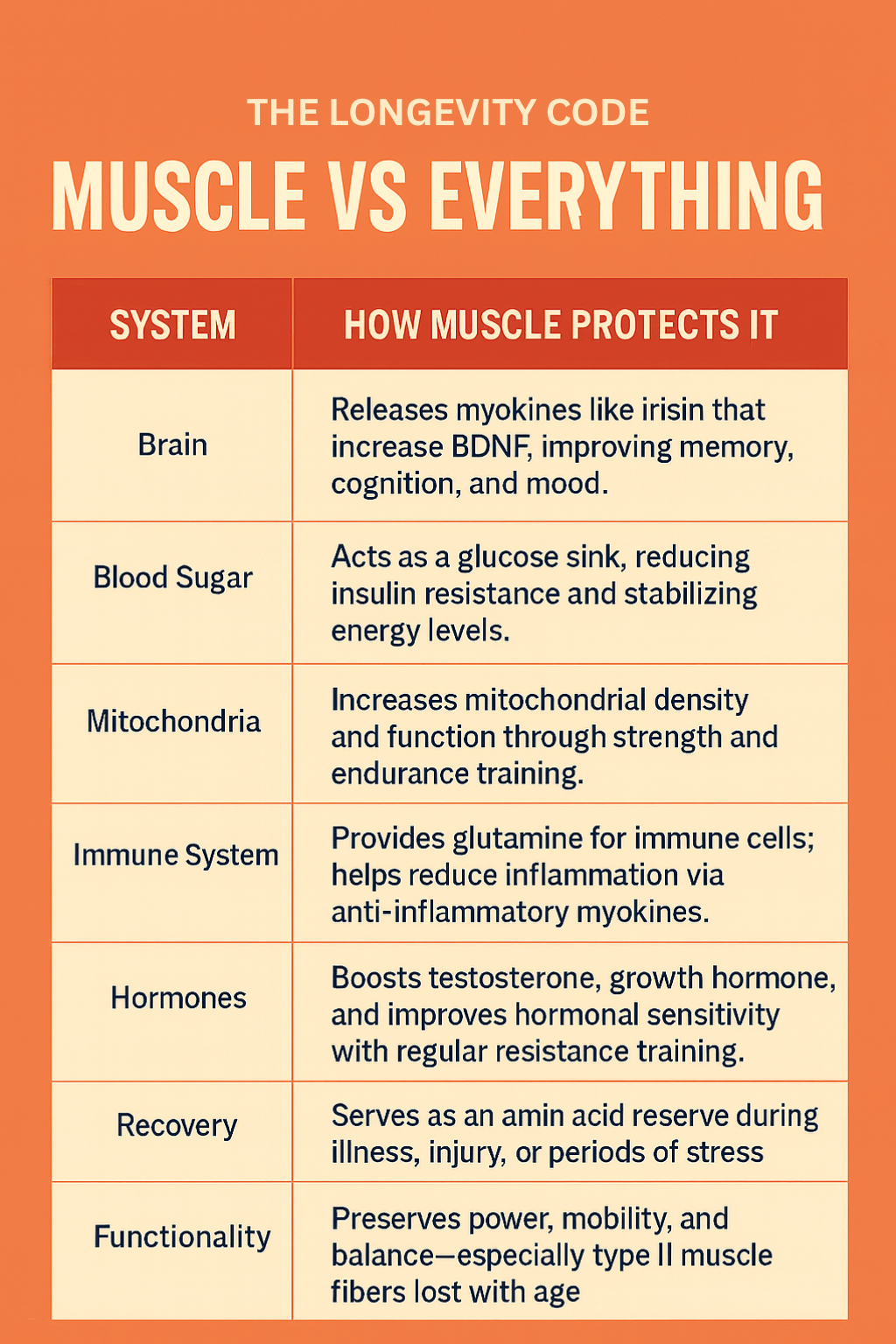- The Longevity Code
- Posts
- 🧬 The most overlooked biomarker for your health
🧬 The most overlooked biomarker for your health
Muscle is doing more than keeping you strong
THIS WEEK’S CODE:
💡 The focus → Beyond strength, muscle is an anti-aging organ
⚠️ The impact → Low muscle mass raises mortality risk and speeds up decline
✅ The fix → Build/preserve muscle through protein, movement, and resistance
Read time: 4 minutes
The number one biomarker for longevity may actually be staring at you in the mirror every time you go to the gym.
Research shows muscle mass is more predictive of lifespan than cholesterol, blood pressure, or BMI.
Muscle doesn’t just move you, it talks to your brain, immune system, and metabolism through chemical messengers called myokines.
While it tends to be treated like a vanity weight, most people lose 3–8% of it each decade after 30.
In longevity science, muscle is emerging as a full-body regulator, shaping brain health, metabolic resilience, and immunity.

Your body’s most underrated organ
As we’re well aware, dating back to prehistoric eras, the strongest tended to survive the longest. We now know muscle mass can help predict survival more accurately than many clinical markers.
A 2014 UCLA study found that muscle mass was inversely associated with all-cause mortality ultimately determining more muscle, longer life.
But it’s not just size. Muscle is an endocrine organ that secretes myokines during contraction: small proteins that influence everything from inflammation to neuroplasticity.
One of them, irisin, increases BDNF in the brain, which is linked to better cognition and mental health.
Other myokines like IL-6 (in its anti-inflammatory form), cathepsin B, and IL-15 help regulate immune function, protect against insulin resistance, and support fat oxidation.
In some respects, muscle can be seen as a communication hub across the body, where the more it’s worked on, the better the signals.

Are you really doing enough?
While most people think staying healthy as they age is about “eating less and moving more”, if done wrong, this formula may actually accelerate muscle loss.
Extended calorie restriction without resistance training can lead to sarcopenia, the age‑related decline of muscle that starts as early as your 30s and can double after 60.
Cardio alone keeps your heart fit but does little to preserve fast‑twitch fibers, which are critical for power, balance, and fall prevention.
Muscle acts as a metabolic sink soaking up excess glucose, lowering insulin resistance, and storing amino acids your body can draw on during stress or illness.
It also plays a role in immune resilience as people with higher lean mass recover faster from infections, surgeries, and hospital stays.
A simple starting point: at least two full‑body resistance sessions per week, 25-30g of protein at each meal, and daily movement that challenges balance and range of motion.

Build a routine that pays you back for years to come
Train heavy (but safe): Use compound lifts (squat, pull, hinge, push) 2-4x/week
Prioritize protein: Aim for ~1.6g/kg/day or about 30g per meal for most people
Zone 2 for mitochondria: Pair strength with low-intensity aerobic to protect endurance and heart
Mobility matters: Hip, spine, and ankle mobility keep movement patterns clean
Don’t overfast: Chronic fasting can work against muscle preservation
Supplements to support: Creatine, leucine, collagen (esp. post-workout)
Muscle as medicine
Muscle is the most modifiable organ in your body and one of the fastest to decline when ignored.
Studies show that even in your 70s and 80s, resistance training can reverse age-related muscle loss within 12–16 weeks.
It’s also one of the few interventions that improves both healthspan and lifespan without a prescription.
More muscle means better mitochondrial density, improved protein synthesis, and higher physical reserve when illness hits.
If you want to age well, train like someone who plans to get old yet stays sharp and bounces back. As we get older and things inevitably go wrong (surgery, infection, injury, etc.), muscle is one of the determining factors on how fast you recover.

TLDR TRIO
📈 More muscle, more life
✅ Better cognition, immunity, and metabolic control
⌛ 2-4x/week resistance + daily protein = anti-aging compounder
